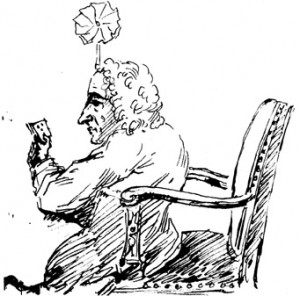Power Quote: John Berryman

We must travel in the direction of our fear.
—John Berryman, October 25, 1914 – January 7, 1972
Power Quote Quartet

You know who wears sunglasses inside? Blind people and assholes. — Larry David
It is a terrible thing to see and have no vision. — Helen Keller
I’m into the girls fancying me and stuff, mad for it. — Liam Gallagher
A man’s errors are his portals of discovery. — James Joyce
Critics on Criticism: Dryden and Pope on the Evils of Hating, Loving Parts
 Apparently something about the Restoration, after all the Charleses and Jameses and Cromwells and who is Catholic and who is Anglican or Puritan, got poets to thinking about the whole versus the part, w/r/t criticism. Thus John Dryden, who was politically moderate but eventually found he had some inclinations toward Rome, on critics who “think this or that expression in Homer, Virgil, Tasso, or Milton’s Paradise to be far too strained”:
Apparently something about the Restoration, after all the Charleses and Jameses and Cromwells and who is Catholic and who is Anglican or Puritan, got poets to thinking about the whole versus the part, w/r/t criticism. Thus John Dryden, who was politically moderate but eventually found he had some inclinations toward Rome, on critics who “think this or that expression in Homer, Virgil, Tasso, or Milton’s Paradise to be far too strained”:
Tis true there are limits to be set betwixt the boldness and rashness of a poet; but he must understand those limits who pretends to judge as well as he who undertakes to write: and he who has no liking to the whole ought, in reason, to be excluded from censuring of the parts. (from “The Author’s Apology for Heroic Poetry and Heroic License,” 1677)
This seems a good rule. I perhaps unfashionably quite enjoy reading good criticism for its own sake, and I believe a person can display a purely critical genius, though their work ought to follow Wilde’s dictum of being a creative act in its own right. I think, here, that Dryden makes a key distinction. He is taking to task critics who profess no taste for any muscular poetry, for the “the hardest metaphors and the strongest hyperboles,” and who then critique individual works of heroic verse that by definition display that muscularity, hardness, and strength.
This guy said in this book: My tastes in reading lately have been way more realistic, because most experimental stuff is hellaciously unfun to read.
Discuss.
Power Quote: Gerhard Richter
“I don’t want to be a personality or to have an ideology. I see no sense in doing anything different. I never do see any sense. I think that one always does what is being done anyway (even when making something new), and that one is always making something new. To have an ideology means having laws and guidelines; it means killing those who have different laws and guidelines. What is the good of that?”
from The Daily Practice of Painting by Gerhard Richter
Corey Haim (RIP) on artistic ambition
httpv://www.youtube.com/watch?v=WLRK-XP_GLE
The direction in my life right now that I’m trying to I guess proceed with in the business is gradually from being the little boy, from the younger, you know, brother, trying to get to be the older brother or the only brother.
And who doesn’t feel that? Me, certainly. Why did Tao Lin start Muumuu House? Older brother. Year of the Liquidator? Older brother.
At what point did you decide you wanted to be the “older brother”? (And I apologize for the maleness of the metaphor. I would like sisters to answer, too.) Have you decided yet?
Monoculture Culture
In her essay “Points of Pressure,” Caroline Bergvall writes:
For many bicultural artists and writers, the processes of identity and of writing acquisition go hand in hand with aspects of cultural belonging and the way this articulates their lived body and speaking voice. When the writer’s cultural and social body accommodates two or three languages and/or cultures, their inscriptive narratives and poetics are necessarily at a break from a monolingual textual body-type and a nationally defined writing culture. It is often accompanied by a propensity towards open-forms and mixed genres, remains dubious and questioning of defining terms, can be resistant of exile or immigrant narratives and their inward longing for a traditionalist past where identities are firmly locked in place, rather than in play.
The Future Is A Stream

25. From which we learn that (a) making correct predictions about the technology future is easy, and (b) writers should remember to put their predictions in suitably poetic language, so it’s easy to say they were right.
25. If we think of time as orthogonal to space, a stream-based, time-based Cybersphere is the traditional Internet flipped on its side in digital space-time. The traditional web-shaped Internet consists (in effect) of many flat panels chaotically connected. Instead of flat sites, where information is arranged in space, we want deep sites that are slices of time. When we look at such a site onscreen, it’s natural to imagine the past extending into (or beyond) the screen, and the future extending forward in front of the screen; the future flows towards the screen, into the screen and then deeper into the space beyond the screen.
26. The Internet is no topic like cellphones or videogame platforms or artificial intelligence; it’s a topic like education. It’s that big. Therefore beware: to become a teacher, master some topic you can teach; don’t go to Education School and master nothing. To work on the Internet, master some part of the Internet: engineering, software, computer science, communication theory; economics or business; literature or design. Don’t go to Internet School and master nothing. There are brilliant, admirable people at Internet institutes. But if these institutes have the same effect on the Internet that education schools have had on education, they will be a disaster.
Power Quote: “The Man”
 People try to get out of themselves and to escape from the man. This is folly; instead of transforming themselves into angels, they turn themselves into beasts; instead of lifting, they degrade themselves.
People try to get out of themselves and to escape from the man. This is folly; instead of transforming themselves into angels, they turn themselves into beasts; instead of lifting, they degrade themselves.
— Montaigne, Essays (1580)
I smiled when I read “the man,” because it was written so long ago. Seems like “the man” has been bringing us down since the 16th century, the most current manifestation being Comcast (host of my internet, cable, and landline) without whom I would only exist in vivo, and how lame is that?

